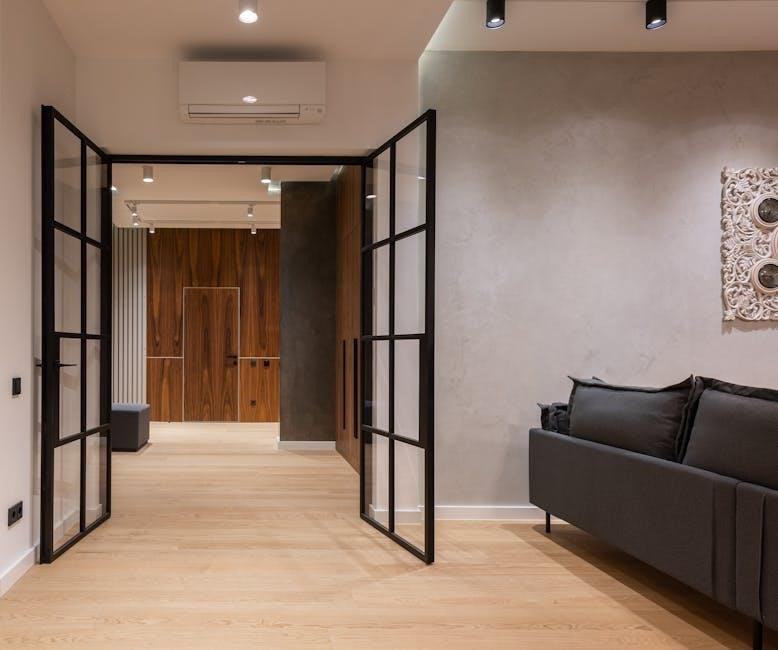A Guide Hall is a versatile community facility designed to host various activities, fostering social connections, and supporting local organizations․ It serves as a central hub for community engagement․
1․1 Definition and Overview
A Guide Hall is a community facility primarily used for recreational and social activities, governed by charitable principles․ It serves as a versatile space for various events, fostering community engagement and providing a centralized hub for local organizations and individuals to gather and participate in meaningful activities․
1․2 Historical Background
Guide Halls originated as simple community structures, historically serving as gathering spaces for local meetings, events, and social activities․ Rooted in charitable purposes, they have evolved over time, often tied to village or town development, becoming integral to fostering community bonds and supporting cultural and recreational initiatives․
1․3 Evolution of Guide Halls in Modern Times
Guide Halls have transformed into multi-functional spaces, integrating modern amenities like advanced audio-visual systems and internet connectivity․ They now cater to diverse needs, from corporate events to community workshops, while emphasizing sustainability and accessibility, ensuring they remain vibrant hubs for social and professional interactions in contemporary society․
Purpose of a Guide Hall
A Guide Hall serves as a central space for community interaction, fostering connections, and supporting various activities, from social gatherings to educational events, empowering communities․
2․1 Community Engagement and Social Interaction
A Guide Hall fosters connections by hosting workshops, cultural events, and support groups, creating spaces for dialogue and collaboration․ These activities strengthen community bonds and promote inclusivity, ensuring diverse voices are heard and valued․
2․2 Hosting Events and Meetings
Guide Halls are ideal for hosting corporate events, seminars, and community gatherings․ They provide a structured environment for sharing updates, conducting Q&A sessions, and fostering engagement․ Regular town hall meetings and workshops are commonly held here, ensuring effective communication and collaboration among participants․
2․3 Educational and Recreational Activities
Guide Halls often host educational workshops, sports, and cultural events, catering to diverse interests․ They provide spaces for learning, leisure, and skill development, making them accessible for all age groups and fostering community well-being through engaging activities․

Types of Guide Halls
Guide Halls vary in design and purpose․ Common types include Community Centers for public gatherings, Corporate Meeting Halls for professional events, and Multi-Purpose Event Spaces for flexibility․
3․1 Community Centers
Community Centers are integral to Guide Halls, offering spaces for social interaction, recreational activities, and educational programs․ They serve diverse groups, fostering a sense of belonging and inclusivity within neighborhoods, making them essential hubs for local engagement and development․
3․2 Corporate Meeting Halls
Corporate Meeting Halls are specialized spaces designed for professional gatherings, such as seminars, client conferences, and training sessions․ Equipped with advanced amenities, they provide a conducive environment for presentations, brainstorming, and decision-making, catering to the needs of businesses and organizations seeking efficient communication and collaboration․
3․3 Multi-Purpose Event Spaces
Multi-Purpose Event Spaces offer flexibility for diverse gatherings, combining functionality with adaptability․ These halls can host conferences, weddings, workshops, and more, featuring modular layouts and modern amenities to accommodate varying needs․ Their versatility makes them ideal for both community and corporate events, ensuring a seamless experience for all attendees and organizers alike․

Key Features of a Modern Guide Hall
Modern Guide Halls feature adaptable seating, advanced audio-visual systems, and accessible amenities, ensuring comfort and functionality for diverse events, from meetings to celebrations․
4․1 Seating and Layout Options
Modern Guide Halls offer flexible seating arrangements, including theater-style, banquet, and classroom layouts․ These configurations cater to various events, ensuring optimal space utilization and attendee comfort․ Adjustable seating allows for easy reconfiguration, making the hall suitable for both intimate gatherings and large-scale events․
4․2 Audio-Visual Equipment
Guide Halls are equipped with state-of-the-art audio-visual systems, including high-resolution projectors, sound systems, and wireless microphones․ These tools facilitate seamless presentations, video conferencing, and multimedia displays, ensuring events are engaging and professional․ Advanced technology enhances communication and entertainment, making Guide Halls ideal for meetings, workshops, and performances․
4․3 Accessibility and Amenities
Guide Halls prioritize accessibility, featuring ramps, elevators, and accessible restrooms․ Amenities include flexible seating, ample lighting, and parking․ These facilities ensure inclusivity and comfort for all users, making Guide Halls welcoming spaces for diverse events and activities․

Uses of a Guide Hall
A Guide Hall is a versatile space used for community events, social gatherings, educational workshops, and recreational activities, serving as a hub for diverse public and private functions․
5․1 Public Gatherings and Town Hall Meetings
Guide Halls are ideal for public gatherings and town hall meetings, fostering open communication and community engagement․ They provide a space for discussions, updates, and Q&A sessions, enabling organizations to share information and gather feedback, while promoting transparency and collaboration among attendees․
5․2 Private Events and Celebrations
Guide Halls are versatile venues for private events and celebrations, such as weddings, birthdays, and parties․ They offer a welcoming space for personal gatherings, ensuring a memorable experience․ Additionally, private events can be organized to raise funds for the hall, supporting its maintenance and community initiatives․
5․3 Workshops and Training Sessions
Guide Halls often host workshops and training sessions, providing a space for skill development and educational activities․ These events support community learning, personal growth, and professional development, while also offering resources for local businesses and organizations to enhance their capabilities and knowledge․
Planning and Organizing Events
Planning and organizing events at a Guide Hall involves creating detailed agendas, promoting the event, and managing logistics to ensure smooth execution and foster community engagement․
6․1 Creating an Agenda
Creating an agenda for events at a Guide Hall ensures clarity and structure․ It outlines key points, timings, and speakers, guiding participants through discussions and activities efficiently while maximizing productivity and engagement․
6․2 Promoting the Event
Promoting an event at a Guide Hall involves using various channels to attract attendees․ This includes social media, flyers, email invitations, and community announcements․ Effective promotion ensures high attendance and engagement, making the event successful and beneficial for all participants involved․
6․3 Managing Logistics and Staff
Managing logistics and staff for Guide Hall events involves coordinating setup, staffing, and supervision․ Ensuring all necessary equipment and resources are available is crucial․ The committee oversees event operations, assigns roles, and ensures smooth execution, addressing any issues promptly to guarantee a successful and organized experience for all participants․
Benefits of Using a Guide Hall
Guide halls foster community bonds, provide a centralized space for activities, and support local businesses and organizations, making them invaluable for social and economic development․
7․1 Fostering Community Bonds
Guide halls strengthen community ties by offering a shared space for social interactions, events, and collaborative activities․ They enable diverse groups to connect, fostering mutual understanding and a sense of belonging among residents, which is essential for building a cohesive and supportive community environment․
7․2 Providing a Centralized Space for Activities
Guide halls serve as central hubs, offering a convenient location for various events, meetings, and gatherings․ By consolidating activities in one place, they enhance accessibility and efficiency, making it easier for individuals and groups to participate and engage in community life․
7․3 Supporting Local Businesses and Organizations
Guide halls play a vital role in supporting local businesses and organizations by providing affordable spaces for meetings, workshops, and events․ This fosters collaboration, innovation, and economic growth, helping to strengthen the community and promote sustainability among local enterprises and initiatives․

Management and Maintenance
Effective management ensures proper maintenance, budgeting, and upkeep of the guide hall, sustaining the facility for community use while ensuring safety and accessibility for all users․
8․1 Roles of the Management Committee
The management committee oversees the guide hall’s operations, ensuring its charitable purposes are met․ They enforce usage policies, manage budgets, and maintain facilities, while also handling fundraising and ensuring legal compliance to sustain the hall’s viability for community benefit․
8․2 Budgeting and Funding
Budgeting ensures efficient use of resources, with funds sourced from rentals, donations, and grants․ The committee allocates budgets for maintenance, utilities, and amenities, ensuring financial stability․ Transparent accounting and periodic audits maintain trust, while fundraising activities and sponsorships supplement income to sustain the guide hall’s operations and community services․
8․3 Maintenance and Upkeep
Regular inspections and repairs ensure the guide hall remains safe and functional․ Cleaning schedules and utility management are essential․ The management committee oversees maintenance, addressing wear and tear promptly to preserve the facility for community use, ensuring it remains a welcoming and reliable space for all activities․
Future Trends in Guide Hall Development
Future trends include integrating advanced technology, adopting eco-friendly designs, and expanding community involvement to create sustainable, adaptable spaces that meet evolving needs and foster stronger connections․
9․1 Integration of Technology
Modern Guide Halls are increasingly incorporating smart technologies to enhance functionality․ Features like high-speed internet, digital booking systems, and energy-efficient lighting are becoming standard․ Audio-visual equipment and interactive tools improve event experiences, while smart sensors optimize resource usage, ensuring these spaces remain sustainable and user-friendly for future generations․
9․2 Sustainability and Eco-Friendly Designs
Modern Guide Halls are embracing sustainable practices, incorporating energy-efficient lighting, solar panels, and eco-friendly materials․ These designs reduce environmental impact while lowering operational costs․ Water recycling systems and green spaces further enhance sustainability, ensuring these spaces remain environmentally conscious and viable for future generations․
9․3 Expanding Community Involvement
Guide Halls are increasingly focused on expanding community involvement through diverse activities and partnerships․ By engaging local organizations and residents, these spaces foster unity and collaboration․ Inclusive initiatives ensure all community members can participate, helping to achieve shared goals and strengthen social bonds for a vibrant, connected future․
Guide Halls serve as essential community spaces, fostering unity and supporting local activities․ Their adaptability ensures they remain vital hubs for social engagement and development․
10․1 Summarizing the Importance of Guide Halls
Guide Halls are vital community spaces fostering social bonds, cultural exchange, and local development․ They provide a centralized venue for diverse activities, ensuring accessibility and inclusivity while adapting to modern needs, making them indispensable hubs for community life․
10․2 Final Thoughts on Their Role in Society
Guide Halls play a pivotal role in fostering community identity, unity, and cultural preservation․ As dynamic spaces, they empower societies by providing a platform for shared experiences, education, and growth․ Their adaptability ensures they remain central to societal progress, enriching lives and strengthening collective bonds for future generations․

Leave a Reply
You must be logged in to post a comment.